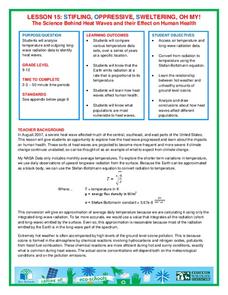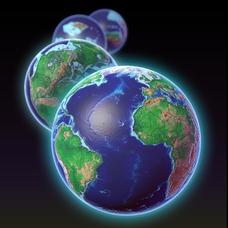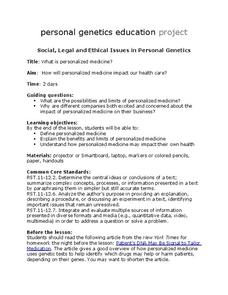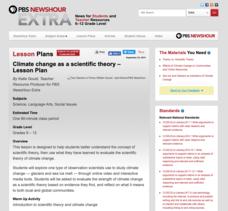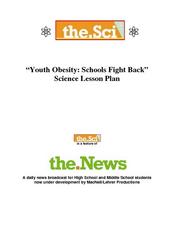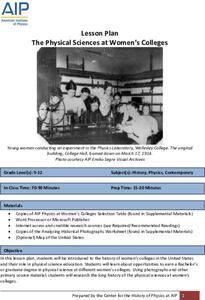National Wildlife Federation
Stifling, Oppressive, Sweltering, Oh My!
Looking for a hot date? Pick any day in August, statistically the hottest month in the United States. The 15th lesson in the series of 21 instructs pupils to investigate the August 2007 heat wave through NASA data, daily temperature...
National Wildlife Federation
I Speak for the Polar Bears!
Climate change and weather extremes impact every species, but this lesson focuses on how these changes effect polar bears. After learning about the animal, scholars create maps of snow-ice coverage and examine the yearly variability and...
National Wildlife Federation
Wherefore Art Thou, Albedo?
In the sixth lesson in a series of 21, scholars use NASA data to graph and interpret albedo seasonally and over the course of multiple years. This allows learners to compare albedo trends to changes in sea ice with connections to the...
National Wildlife Federation
Green Green Revolution
School budgets don't have a lot of extra money, so when students propose saving the district money, everyone jumps on board. The first activity in the series of 21 introduces the concept of an energy audit. Scholars form an eco-action...
National Wildlife Federation
Ghost Town
Around 93 percent of the reefs on Australia's Great Barrier Reef have been bleached, and almost one quarter of them are now dead. Scholars research the sea temperatures, especially around the areas with coral reefs, to make connections...
National Wildlife Federation
Quantifying Land Changes Over Time in Areas of Deforestation and Urbanization
Is qualitative or quantitative research more convincing when it comes to climate change? In the eighth lesson during this 21-part series, scholars begin by performing a quantitative analysis of deforestation and urbanization. Then, they...
National Wildlife Federation
Why All The Wiggling on the Way Up?
Some of the CO2 emitted by burning fossil fuels is removed from the atmosphere by natural sinks, such as the ocean. The fifth engaging lesson in the series of 21 examines the CO2 data from three very different locations. It then makes a...
National Wildlife Federation
Get Your Techno On
Desert regions are hotter for multiple reasons; the lack of vegetation causes the sun's heat to go straight into the surface and the lack of moisture means none of the heat is being transferred into evaporation. This concept, and other...
NOAA
Methane Hydrates – What's the Big Deal?
Have you ever tried to light ice on fire? With methane hydrate, you can do exactly that. The ice forms with methane inside so it looks like ice, but is able to burn. The lesson uses group research and a hands-on activity to help scholars...
NASA
Dark Matter NASA Conference
Young scholars calculate the escape velocity of planets in our solar system and use that knowledge to calculate the escape velocity for NGC 2300 group. They then suggest reasons for the escape velocity to be higher than possible given...
NASA
Two Versions of Gravity: Newton and Einstein
We have all heard the debate about teaching both theories, but an innovative activity takes the discussion to a new level. Scholars research and debate Newton's Law of Gravitation versus Einstein's General Theory of Relativity with...
Howard Hughes Medical Institute
EarthViewer
Can you imagine Washington DC and London as close neighbors occupying the same continent? Learners will be fascinated as they step back in time and discover the evolution of the earth's continents and oceans from 4.5 billion years ago to...
CPO Science
Physics Skill and Practice Worksheets
Stop wasting energy searching for physics resources, this comprehensive collection of worksheets has you covered. Starting with introductions to the scientific method, dimensional analysis, and graphing data, these skills practice...
Howard Hughes Medical Institute
The Making of the Fittest: The Birth and Death of Genes
After watching an engaging 13-minute video about the colorless blood of icefish, future ichthyologists examine icefish blood and non-icefish blood (blood samples are simulated with Karo syrup mixtures) to determine advantages of...
Howard Hughes Medical Institute
The Making of the Fittest: Natural Selection in Humans
Sickle cell disease only occurs when both parents contribute the trait, and mostly in those of African descent. Where did it come from? How did it evolve? Tony Allison, a molecular biologist, noticed a connection between sickle cell and...
Personal Genetics Education Project
Personalized Medicine
Genetics learners read an article and watch a video about personalized medicine and the hope it holds for treating patients more specifically than doctors currently are able to. They research, design, and produce a brochure about the...
Personal Genetics Education Project
Genetics and Reproduction
Disease prevention or designer babies? Use a set of slides to introduce the growing practice of preimplantation genetic diagnosis, or PGD. Teens read related articles and then break into groups to address different scenarios. Afterward,...
PBS
Climate Change as a Scientific Theory
Get your class thinking about climate change as a scientific theory. Guided by a handout, emerging earth scientists read articles and take notes about glaciers and sea ice. To conclude, they write an evaluation of the evidence for...
Howard Hughes Medical Institute
Survival of the Fittest - Variations in the Clam Species Clamys sweetus
It's not often that you come across a clever laboratory activity that is both imaginative and comprehensive! Using M&M's and Reese's peanut butter candies to represent two different clam species, young biologists test for "relative...
Curated OER
Youth Obesity: Schools Fight Back
Explore nutrition and healthy eating habits with a study on youth obesity. Learners watch a PBS documentary on the obesity epidemic which discusses government programs aimed at healthier choices, as well as more localized efforts. Kids...
American Institute of Physics
The Physical Sciences at Women's Colleges
After a brief introduction to the history of women's colleges in the United States and a discussion of the resistance such institutions faced, young scientists investigate seven traditionally women's colleges and their physics programs....
American Institute of Physics
The Physical Sciences at Historically Black Colleges and Universities
The history of science instruction at Historically Black Colleges and Universities (HBCUs) is the focus of a lesson that explores the early challenges these institutions faced in accessing equipment for their labs and instructors for...
Personal Genetics Education Project
Genome Editing and CRISPR
Explore the excitement and ethical challenges of CRISPR and genetic-editing technology. Participants engage in do-nows, view a slideshow, and collaborate on scenarios about genetic editing. Group members analyze scenarios to generate...
Personal Genetics Education Project
Reproductive Genetic Testing: Technology, Access, and Decision Making
Explore the complexities of reproductive genetic testing respectfully in the learning space. Scientists read articles, view a slideshow, and complete a do-now about genetic technologies. A fishbowl activity allows scholars to discuss the...


